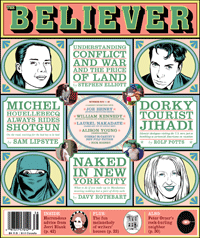The Tourist Who Influenced the Terrorists: My essay in The Believer
.

If Sayyid Qutb had been a more mindful traveler, would al-Qaeda have never existed?
That’s the question at the heart of my new essay, The Tourist Who Influenced the Terrorists, which appears in this month’s issue of The Believer.
Subtitled “How One Egyptian’s Bad Haircut from a Greeley, Colorado Barber in 1949 Provided Ideological Fuel for 9/11,” my essay analyzes the American sojourn of Egyptian scholar and Muslim Brotherhood publicist Sayyid Qutb, whose Islamist writings are said to have influenced the likes of Ayman al-Zawahiri and Osama bin Laden. Between 1948 and 1950, Qutb lived as a scholarship student at Colorado State College of Education, and he summarized his expatriate experience in an short travel memoir entitled “The America I Have Seen,” which appeared in the November 1951 issue of Egypt’s Al-Risala magazine.
As travel reportage, “The America I Have Seen” doesn’t exactly provide the reader with a vicarious window into living in the United States. Structured as a series of short, thematic arguments, Qutb’s essay primarily attempts to prove that America — despite its great wealth and scientific genius — suffers from a corrosive moral and spiritual primitiveness. This thesis might have carried some rhetorical weight had Qutb backed it up with evidence from his own experiences, but — oddly — the Egyptian traveler didn’t have many direct encounters worth sharing. In fact, were one to strip the political cloaking from his essay, it’s apparent that Qutb’s experience of America was characterized by an oddly familiar combination of superficial experiences, paranoid conjectures, and passive culture shock.
In other words, Qutb spent his time in Colorado not as a nascent Muslim Marx, but as the most banal of interlopers: a tourist.
In my Believer essay, I analyze Qutb’s travel reportage using anthropological and sociological studies of tourist behavior. My conclusion is not that Eastern travelers journeying West see the world in a unique way, but that they can be just as credulous, self-absorbed and touristically dorky as their American counterparts:
The setting that so scandalized Qutb was not a place of hippie-era love-ins or disco-era cocaine orgies, but Truman-era conservatism. Greeley, Colorado in 1949 was a dry town, with an abundance of churches and not a single bar. Still, our Egyptian traveler was able to locate a den of licentiousness in none other than a church sock hop. “And they danced to the tunes of the gramophone,” Qutb writes, “and the dance floor was replete with tapping feet, enticing legs, arms wrapped around waists, lips pressed to lips, and chests pressed to chests. The atmosphere was full of desire.” Qutb then goes on to describe — without alluding to a conversation with any girl in particular — American girls’ knowledge that “seductiveness lies in the round breasts, the full buttocks, and in the shapely thighs, sleek legs and she shows all this and does not hide it.”
As these passages suggest, Qutb was content to play the role of voyeur during his time in America, interpreting events not as they might have been understood by the Americans who lived them, but as they sparked his fevered and pious imagination. Jazz was “music that the savage bushmen created to satisfy their primitive desires”; football fans were “enthralled with the flowing blood and crushed limbs, crying loudly, everyone cheering for his team”; sexual choice was “a gripping slavery and a relapse to the first primitive levels.” American haircuts were a disgrace, and the practices of salting watermelon and drinking unsweetened tea (both unknown in Egypt) were revelatory signifiers of cultural stupidity.
Considering that Qutb’s rejection of Western values was informed by such a willfully cartoonish misinterpretation of American culture, it’s natural to wonder how his beliefs might have been tempered had he been a more engaged traveler.
My full critical essay is not available online, but The Believer (which is a National Magazine Award-winning literary offshoot of McSweeney’s) can be found in most bookstores.

Category: Rolf's News and Updates